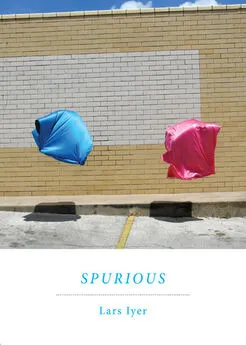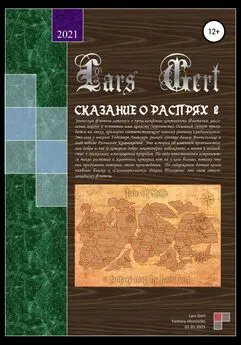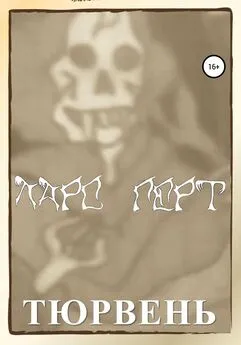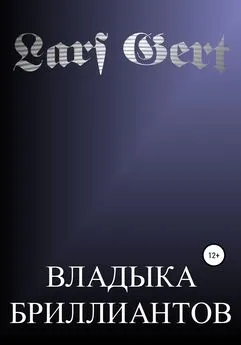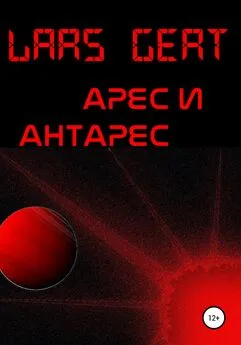Lars Iyer - Spurious
- Название:Spurious
- Автор:
- Жанр:
- Издательство:Melville House
- Год:2011
- ISBN:нет данных
- Рейтинг:
- Избранное:Добавить в избранное
-
Отзывы:
-
Ваша оценка:
Lars Iyer - Spurious краткое содержание
In a raucous debut that summons up Britain's fabled Goon Squad comedies, writer and philosopher Lars Iyer tells the story of someone very like himself with a "slightly more successful" friend and their journeys in search of more palatable literary conferences and better gin. One reason for their journeys: the narrator's home is slowly being taken over by a fungus that no one seems to know what to do about.
Before it completely swallows his house, the narrator feels compelled to solve some major philosophical questions (such as "Why?") and the meaning of his urge to write, as well as the source of the fungus… before it is too late. Or, he has to move.
Spurious - читать онлайн бесплатно полную версию (весь текст целиком)
Интервал:
Закладка:
Rosenzweig is our guiding star, burning brightly above everything. He’s our inspiration. Ah, if only we could write like him, wholly in declamations! If only we could let our thought flash out in sentences like bolts of lightning!
Imagine him, Rosenzweig, at the Macedonian front, says W., shells falling around him. Imagine him in the trenches (were there any trenches in Macedonia?) propped up against a dirt wall, writing another postcard to his mother.
Dear mother , he would write, and then off he’d go, W. says. Dear mother , and then he’d write his thoughts about God or death or Judaism horizontally, in the space left for you to write, and then vertically, as they used to do in the nineteenth century.
He might die at any moment! A shell might fall and explode then and there! But he’s writing horizontally, then vertically and then slantwise across his postcard. Death was very close to him. And not just his death, but the death of everyone and everything, the death of old Europe. Didn’t Rosenzweig above all understand the apocalypse? And didn’t he understand how the messianic idea must be thought from within the apocalypse?
By the time The Star of Redemption was published, he’d already left the university, W. says. He’d left it behind! He’d founded a new kind of establishment. — ‘He was educating young Jews’, says W. ‘Including Kafka. Did you know he taught Kafka?’, W. says. ‘Well he did. Rosenzweig taught Kafka. Which is quite extraordinary, when you think about it. Kafka and Rosenzweig, in the same room as one another, teacher and pupil’.
Thought! cries W. What does it mean to think? Why can’t we think? Why are we so singularly incapable of thinking? We cultivate the external signs of thinking, W. says. We can do good impressions of thinkers, he says, but we’re not thinkers. We’ve failed at the level of thought .
He knows they’re out there, W. says, real thinkers. He knows how natural it is for them, how they glide through the milieu of thinking like whales through deep water. It’s effortless! It’s as natural as breathing! They’re used to thought, they’re fully confident of their ability to think, which might as well be God-given.
They can’t help it! They couldn’t do otherwise! Thought is their element, their milieu, we agree, just as idiocy is our element and our milieu. They are virtuosos of thinking just as we are virtuosos of idiocy. Do you think they envy us as we envy them? Do you think they even know of the existence of idiocy? They don’t know of it and they don’t believe in it. They don’t need to. Thought is not the absence of idiocy, although idiocy is the absence of thought.
‘Do you think our leaders had a sense of our idiocy?’, W. asks. Was it real for them? Did it confuse or confound them? Did it prevent them from thinking? Not at all. Not for a moment.
Do you remember how he spoke? he says of our first leader. His seriousness? He wasn’t swayed by us. Our idiocy was annulled. Just for a moment, we were quiet. Just for a moment, idiocy was interrupted and we were calmed. It was marvellous, W. said.
And our second leader. Do you remember what he told us? How he’d dropped out of college. How he’d worked as a pastry chef. How he’d taken up featherweight boxing — and all in the name of thought. All because he felt himself unworthy of thought, and tried to turn away from it, but there it was nonetheless, his fate: thought. There it was, waiting for him, the most natural thing in the world: the capacity to think.
There was no presumption about him, we both agree. Thought was natural to him; it didn’t surprise him and nor did it give him any sense of distinction. He was just like us, we agree, except that he could think. Which means he wasn’t at all like us, not really.
And our third leader, perhaps the greatest of them all! Do you remember how quiet he was? Do you remember how silent the room became when he spoke, and how we leaned in to listen more closely?
We thought we were party to something, we remember. We thought we were in on a secret, that now, at last, the power to think would be here, in person. We thought we would be on a par with it, the emergence of a thought. It was terribly flattering. We were, for once, to be the occasion of thought, rather than its obstacle. Thought had been very close to us that afternoon, hadn’t it? Maybe we even believed we could think, which is the greatest illusion.
We’re Brod and Brod, we agree, and neither of us is Kafka. Neither of us; but we can dream, can’t we, of the imaginary Kafka we would fawn over and whose work we would promote? We can dream of our fervid works of commentary and our public statements — always needlessly simplifying, always full of empty pathos and sham hagiography — on behalf of our friend.
We can dream of nursing him through his final sickness and then of preserving his work for posterity. He’d ask us to throw it all away, all his unfinished drafts and private correspondence, but what would we do? Publish it piece by piece for a grateful humanity, with our stupid editorial comments that generations of scholars would read to one another in disgust and amusement.
‘We’re in free fall’, says W. ‘Or Limbo. We must have committed a terrible crime in a former life, that would account for it, wouldn’t it? That’s what you Hindus would say’.
This is our Purgatory, W. says, or perhaps it’s just his. Perhaps I am his Purgatory, says W., and I am his Limbo. Perhaps his friendship for me is only a punishment for some great crime he committed in a former life, he’s not sure what.
Above all, W. says, I should work earnestly on another book. It’s the only way I experience my own inadequacy, he says. He knows me: without some project, I’ll become far too content. My idiocy will become an alibi, an excuse, which is just a way to avoid it altogether. — ‘You have to run up against your idiocy, to shatter yourself against it’, W. says. ‘Nothing can begin unless you experience your idiocy’.
My idiocy is theological, W. tells me. It is vast, omnipresent; not simply a lack (of intelligence, say), though neither is it entirely tangible or real. We picture it as a vast, dense cloud, and then as a storm, flashing with lightning. It can be quite magnificent, he says. It can shock and awe, W. says. I am that I am , says W., that’s all it says.
On the other hand, he says, sometimes my idiocy is only a simple absence, a pellucid sky. Not a thought crosses my mind for weeks, does it? says W. Nothing at all. I’m untroubled by thought and untroubled by thinking.
His idiocy, says W. is more a kind of stubbornness or indolence. It’s never thunderous as mine can be, and nor is his head ever really empty. His idiocy is only a niggling reminder of his own incapacity, against which he runs up freshly each day.
Sometimes I think the damp is receding, I tell W. on the phone. True, the air is still full of water and little spores of mildew — no doubt of that, but the plaster is lightening, there at the edges where it was most soaked, and the walls no longer run with water, though the new cabinets are still full of mildew and the whole flat smells of damp and rot.
It’s the oldest smell, the most familiar one: the great rotting of everything, the great saturation. Away for a few days, my return confirmed it, I tell W.: home, for me, will always mean the smell of damp, and that first of all. Open the door, there it is, the old smell, breathe it in, along with the spores of mildew …
Of course, I’m also worried that the damp is returning to itself to regather its strength: withdrawing only to bloom once again across my walls and ceiling, only more magnificently this time, with a new palette of colours. What colours this time? What richnesses? No doubt the damp is regathering itself to return, I tell W., with more force, with more splendour, and with new and splendid spores to send out into the air.
There’s crumbled brick and wood on the work surfaces, I tell W.: the ceiling continues to cave in; the hole is still wide open. What’s up there? Something terrible. Something dark. There’s an open slice between the flats. I hear the voices of the tenants upstairs echoing there, ghostly, so I can’t make out what is said. Yes, there’s something terrible there, the source of all damp, there between the flats.
‘So how fat are you now?’, says W., ‘you must be really fat. Are you eating at the moment? What are you eating?’
W. has always been intrigued by my eating habits. He likes to put his hand on my belly. — ‘It’s big’, he marvels. ‘But this is just the start. You’re going to be enormous’.
W. remembers the elasticated trousers of the American professors he’s met. There was a whole herd of them, he says, like walruses on a beach, all with elasticated trousers. That’s what you’ll be wearing soon, says W., great billowing trousers with trouser legs like circus tents.
Food is a sacrament, W. has always believed, which is another reason he thinks I am so disgusting. I have no sense of food, he says, I could be eating anything. For a long time, he remembers, I lived only on discounted sandwiches from Boots, 75p a packet.
He remembers me telling him of my circumambulations of town in search of discounted sandwiches. My great circumambulations, W. says, taking in every possible shop that sold stale, discounted sandwiches.
For a long time, W. remembers, I ate only gingerbread men, five a day. I would buy a packet of five stale gingerbread men from the discount bakery and a fourpack of own-branded supermarket lager from Kwik Save, the very worst.
‘No wonder you were always ill’, W. says. ‘No wonder you were always complaining about your stomach’. Of course, I was poor then, W. concedes, but that was no excuse.
Gluttony has always appalled W., who has a small and delicate appetite. He always undertakes special measures when I come to visit him, to make sure there’s enough food in the house. It was part of the reason he bought his new fridge, W, says. — ‘You’re greedy, greedy!’
When I text from the airport to tell him I’ve arrived, he opens a bottle of Chablis or Cava and puts the glasses on the table, and then unwraps a block of Emmenthal and brings out his sliced meats, along with olive oil and relishes. He’ll offer bread, which he will have made himself, and slices of smoked salmon.
‘Only the best!’, says W. ‘Only the best for my friends!’ Food’s a gift, W. says, the greatest of gifts, which I desecrate every time I visit him.
A little later. — ‘Food is for the other’, W. announces. ‘It’s a gift’. He lays out slices of Emmenthal and cold meat. — ‘You’re the other’, he says, ‘so I have to feed you’. From your own mouth? — ‘That’s what Levinas says’. W. opens his mouth. — ‘Do you want some? Do you?’
Sometimes, I remind him, W. likes to explain things about me to other people like an indulgent mother. — ‘The thing about Lars is …’, he’ll begin. Or: ‘What you have to understand about Lars is …’ And best of all, when he’s feeling very tender, ‘What I love about Lars is …’ Is that it, then? I ask W., do you love me? — ‘Yes, I love you’, says W. ‘You see, I can talk about love. I can express my feelings. Not like you’.
I keep a mental list of W.’s favourite questions, which he constantly asks me so as to ask himself. — ‘At what point did you realise that you would amount to nothing?’; ‘When was it that you first became aware you would be nothing but a failure?’; ‘When you look back at your life, what do you see?’; ‘How is it that you know what greatness is, and that you will never, ever reach it?’
Читать дальшеИнтервал:
Закладка:
